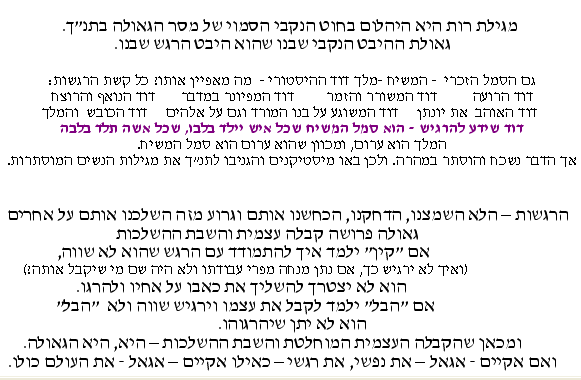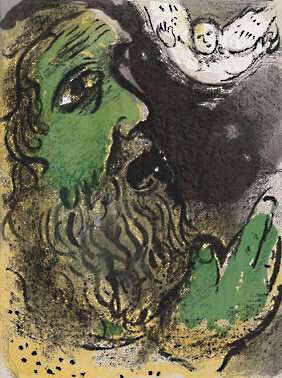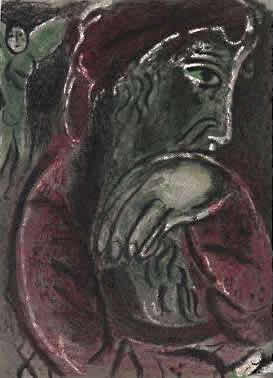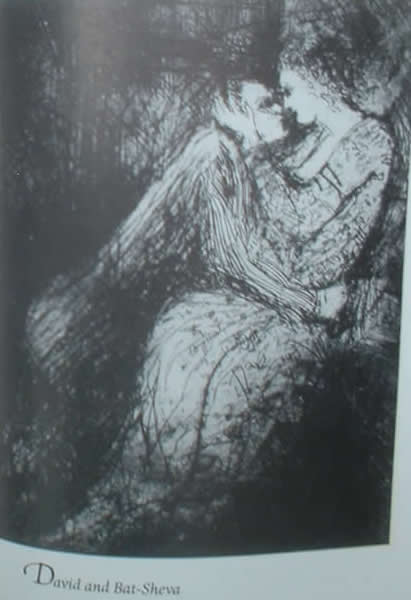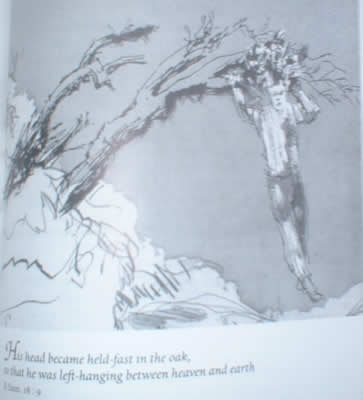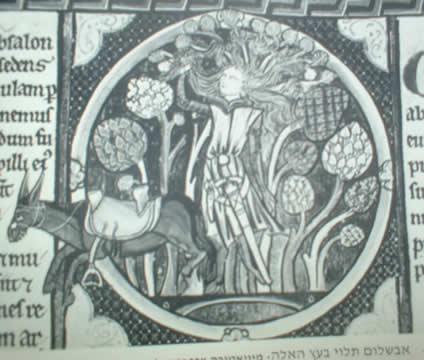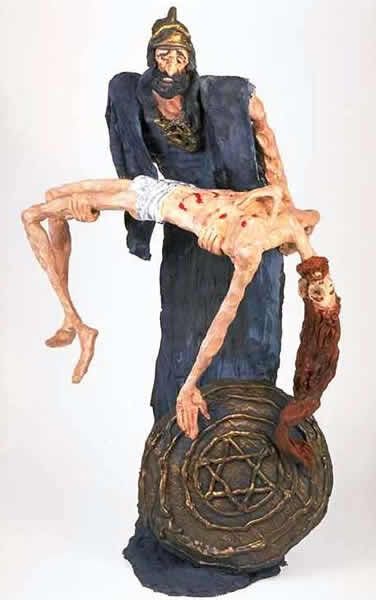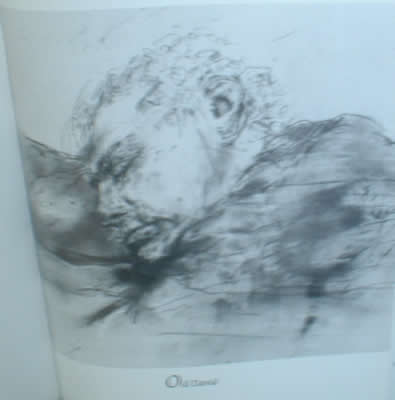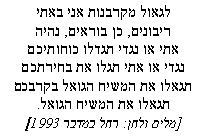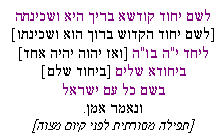| The
Purpose of HEALING - K.I.S.S.
- as stated 12 years ago - was and is
to help me and my potential P E E R s
"to HEAL ourselves into WHOLEness,
and - by extension - all of CREATion!" |
|
I focus my experiencing and awareness on being
"a pioneer of Evolution
in learning to feel":
I let my Body vibrate and my Heart 'womb'
pain, shame, fear, boredom, powerlessness,
so feelings can >heal >guide>fulfill>evolve,
and ~~~ offer ~~~"goldmines"~~~ to us all!!
"I
want you to feel everything, every little thing!"
|
|
| |

2004~~~Dedicated
to my daughter-in-love Efrat-Rut ~~~2011 |
|
MESSIAH Bat-Sheva &
David or The
HIDDEN FEMALE THREAD of REDEMPTION in the BIBLE
2004
Preface
blue links - mainly English
orange links - mainly Hebrew
|
|
|
|
|
|
|
|
|
|
|
|
|
|
|
|
|
|
|
|
|
|
|
|
|
|
|
|
|
|
|
|
|
|
|
|
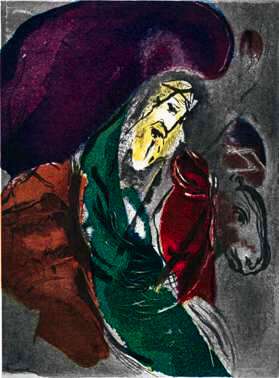 |
The
Bible
of
Feelings
and
Sensations
Chagall's
Jeremia
and
Hiob
|
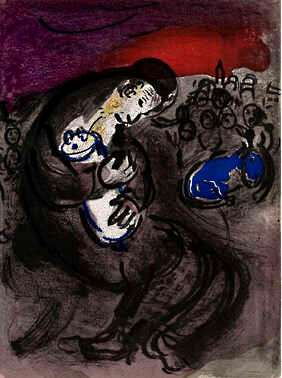 |
"Since I was very young, I was
captivated by the Bible.
It has always seemed to me and it still does,
that it is the greatest source of poetry in all times.
Since then I've been looking for this reflection in life and in art."
[Marc Chagall, see the entry of "My
Life's Testimony to my Life's Learning 1982-2003
]
2004_06_24
The following entry was re-edited on
K.i.s.s.-log 2008_08_05,
and updated there on 2011_06_19
All poetry,
unlike linear historical reports, scientific articles or philosophical
treatises,
conveys feelings and sensations.
But the way, the Hebrew Bible lets its characters express feelings,
has been unmatched in literature until recently.
Instead of talking
"about" feelings in the Bible, I advise you, even if you
grew up in the Hebrew language,
to immerse yourself in
Everett Fox' Translation of the books of Samuel (1999):
"Give us a King!"
Samuel, Saul, and David
This
new translation follows Buber-Rosenzweig's
concept of the wholeness of the Bible
An extensive sample
of this translation can be savoured
in "Megilat"
Bat-Sheva (David-Bat-Sheva-Uriyya)
and in Victims
of Sex Drive (Amnon-Tamar-Avshalom)
Here I'm quoting from the general Introduction of Fox
and from the introduction to the two - interrelated - narratives:
David IN CONTROL AND
OUT OF CONTROL
2. Samuel 9-12
[David , Bat-Sheva , Uriyya]
[full text see "Megilat"
Bat-Sheva]
|
THE GREAT REBELLION
2. Samuel 13-20
[Amnon - Tamar - Avshalom]
[part of text see Victims
of Sex Drive] |
I'm also inserting some of the paintings, etchings
and drawings by Schwelbel which enrich the translation
Fox' focus throughout
his excellent essays is "the view of power and justice",
while my focus is:
the real reason for the failure of "power"
as the failure of every religious or moral ideal:
the denial of the power of feelings and the incapacity to deal with
them.
Despite this difference of focus I was so glad to discover two days
ago,
that Fox expressively points out the role of feelings in the books
which tell the drama of David Messiah.
This is, no doubt, the result of his translating the Bible in the
way I , too, was taught by Rosenzweig and Buber.
The translator's example of tracing the "Leitwort" (leading
word) "HEART" [what an example !] will prove this.
|
"............
.At the end of the last judge's - Samuel's - career, this is
what leads the Israelites to make the fateful move of requesting
a king, "to lead us"
so "that we may be like all the
other nations." In response, God comes
to Samuel in a vision, saying "they
have rejected me": the people, in
the name of security and a desire to fit in with the world's
definition of success .... ...... lead ... to a fratricidal,
unjust and ultimately defeated society.
This view of power is presented
through the careers of three major characters - Samuel, Saul,
and David.............................
And finally, David, chosen to found a dynasty
"for the ages," is remarkably successful
in his public endeavors, only to come perilously close to losing
it all through his private actions. Driven from the throne by
his own son, he is saved solely by the disobedience .. of his
[chief of staff] Joab.
In these dramatic stories, and
the complex way in which they are played out, lies the kernel
of a concept of what it means to be human and
have leaders....
These books, to be sure, record
the leaders' successes, but they are more interested
in their failures, and it is in confronting their failures that
the reader is empowered to ponder the meaning of responsibility
and leadership for our own time.............
Nowhere is this as clear as in
the case of the book's main focus, David.
As the character whose name appears more often in the Bible
than that of any other human being, and whose story is its longest
continuous story, he occupies a central place in the biblical
compilers' world of ideas and images...................
......and ultimately he is able
to unify a tribal society, secure lasting peace, and create
a new order based on a triad of dynasty, royal city, and temple.
What a success story!
Yet at the very moment that worldly
success betokens divine and human approval of David, his own
actions topple him from the summit. He
commits adultery with Bathsheba and has her husband Uriah murdered
in 2 Sam. 11 and is condemned
and punished in chap. 12.
Immediately a grave series of
events follow, rape and murder perpetrated by and among David's
own children, that themselves lead to a terrible and costly
revolt.
Thus, in broadest perspective,
the portrayal of David in Samuel, far from being an idealized
hero account, ... is dominated by what Buber rightly characterizes
as "two great stories of flight."
[David's flight
from King Saul and David's flight from his son Absalom]
That is, the Bible's central human
character spends more time in running than he does in victory
parades or on the throne. .....................
[2013-10-13-the same is true for Ya'aqov-Yisrael:
his flight from Esau - away from home - is mentioned 3 times
and his flight from Lavan - back home - is mentioned 4 times!]
.......... No
one in the Bible gets away with anything
- not Jacob, the ancestor of Israel,
not Moses, the liberator and lawgiver himself,
and not even the charismatic and beloved David,
much as he is said to "strengthen
himself in YHWH his God" (1..
Sam. 30:6)
and despite the fact that he is credited in biblical tradition
with writing some of the world's great religious poetry in the
Psalms.
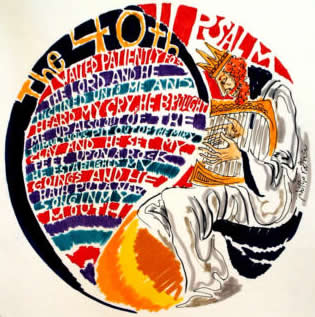
Phillip Ratner
|
The Bible supplies a second answer
to the challenge posed by kingly power:
the counter-institution known as prophecy.
In the biblical world this transcends
the popular conception of "prophesying" (prediction),
and becomes the most passionate, trenchant form of social criticism.................
These great dissenters figure powerfully
in the book of Samuel as well..............
.......................
......................the
head is not the only body part to have interpretive value in
Samuel.
The heart, too, comes
into play,
particularly in the memorable cycle of stories
that recounts Absalom's rebellion against his father David
(II Sam. 13-20)
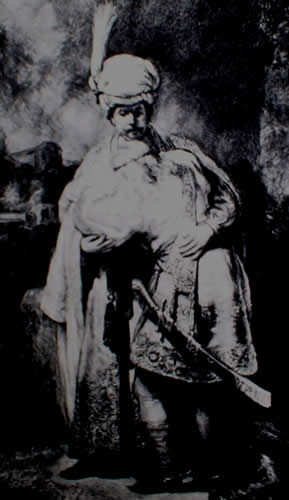 the
illusion of a reconciliation
the
illusion of a reconciliation
between father and son,
after Avshalom had killed his brother Amnon.
|
The
tone is set already in the opening story, the rape of
Absalom's sister Tamar. Amnon,
the crown prince, pretends to be ill and requests that
his half sister make levivot
, usually translated as "cakes", for him.
The noun occurs four times, and the root appears twice
more in verbal form. But as some interpreters have noticed,
the homonym (levav)
means "heart", and the verbal form of l-v-v
occurs in the Song of Songs (4:9),
"You
have captured-my-heart" . ......
From this opening
salvo we are prepared for permutations of the word throughout
the story.
Absalom, on hearing that Amnon has raped Tamar, counsels
his sister not to "take
it to heart"
(13:20);
when the moment is right - Amnon's
"heart is merry with wine"
(13:28)
Absalom
has his henchmen murder Amnon;
King David, misled by the resulting outcry into thinking
that all of his sons have been killed,
is corrected by Jonadab, who informs him that Amnon alone
is dead and tells him
not to "take it to heart"
(13:33);
Joab,
David's chief of staff, notices that the King's "heart
is toward Absalom" (14:1),
and reconciliation is therefore necessary;
but .. . Absalom rebels against David, and meets his end
at the hand of Joab,
who drives three darts "into
Absalom's heart"
as he swings in "the heart
of the oak"
(18:14).
There are several more idiomatic
uses of the word in the story (14:13,
15:10, 16:3, 19:15);
but the significant ones occur
in 15:6, where Absalom "steals
the hearts" of the men of Israel:
in 19:8, where Joab urges David to "speak
to the hearts" of those same men;
and in 19:15, where the King 'inclines
the heart of the men of Judah" toward
him.
|
This key word,
which is usually translated out for idiomatic reasons
(JPS, "the New Jewish Publication
Society Version 1985", variously renders the above examples
as
"cakes.... keep in mind...merry...think...mind...chest...hearts...placate...hearts",
respectively ),
is probably a "leading word" in Martin Buber's definition
, that is,
a word used thematically to point to a major message in the
narrative. .............
By presenting different uses of the leading word,
but retaining the sound links between different passages,
the text encourages readers themselves to "take to heart"
the painful lessons of this narrative,
one that begins with a lovesick prince
but whose roots lie in another affair of the heart (the David
and Bathsheba incident).
|
.
Having
begun with heads and hearts, we may make a final broader observation.
Samuel is a book that talks about deep and visceral
emotions.
Characters feelings are frequently described as "bitter"
and their behavior as "rough,"
and they express extreme "distress" and "upset."
But the text is visceral in another, quite literal sense.
From head to foot (cf. 2. Sam. 14:25),
the human body
absorbs a good deal of the book's energy:
We move
from Absalom's hair - cause of his pride and
perhaps his death -
to failing eyes and broken neck (both Eli's);
ears (Saul's) are avoided;
hearts weaken and are stirred;
some hands slacken,
while others are ready to close in on David;
ribs are pierced in revenge and assassination;
feet (Mephiboshet's) are lame;
the blind and the lame seek to bar David's takeover of Jerusalem;
and, not least, genitalia, notably David's,
become the cause not only of personal but also national disaster.
The Bible ... frequently makes reference to parts of the body
in both its narratives and its poetry,
but Samuel uses them to a remarkable degree.
..............
One
is reminded of a passage from Isaiah (1:5-6),
in which the prophet tries to convey
the all-pervading corruption of Judean society:
"Every head is ailing,
and every heart is sick.
From head to foot
No spot is sound:
all bruises, and welts,
and festering sores --
Not pressed out, not bound up,
not softened with oil".
.....
|
|
...
Samuel's greatest enigma [is], the figure
of David himself. ... a man who is acclaimed and loved by others
(including his readers), but of whom it is never said that he
loved anyone. How may we reconcile the book's complex portrait
of him with what he came to mean to generations of Jews and
Christians ....
... for Jews....crystallized in the image of "Messiah Son
of David," a future God-sent king of David's line who,
unlike most of the biblical kings, would not fail, and who would
usher in a final age of peace and prosperity for all humanity.
For early Christians as well, David naturally was connected
with the figure of the Messiah, both as a foreshadowing of Jesus,
in the person of the popular ancient symbol of the "shepherd
king," and as his ancestor. It is no accident that
the Gospel of Matthew, the opening of the New Testament, begins
with the phrase, "An account
of the genealogy of Jesus the Messiah, the son of David, the
son of Abraham". David thus provides the crucial
link between Christianity's literary and biological ancestors,
the Hebrew Bible and the Jews, and the new community of believers.
Should
we write off this posthumous David, beloved paragon of piety,
as simply the product of wishful thinking?
Or should we dismiss his at times problematic behavior,
as portrayed in Samuel,
merely as part of a critical tradition
that crept its way into an otherwise unblemished account of
a glorious past?
To go in either direction is to lose the richness of David.
It is more likely
that Samuel's morally compromised figure of David
has been retained by Jews and Christians
precisely because of his depth and suitability
as a mediator between the human and the divine.....
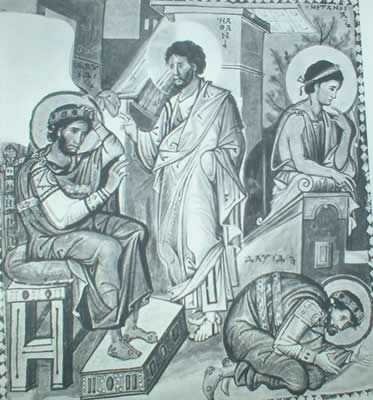 |
.... David,
as a man who is sincere but hardly a saint, has through
the ages provided a powerful model for repentance.
In the Bathsheba episode he immediately and unflinchingly
admits his guilt;. |
Warrior, ascender
to kingship, singer of sacred songs, sinner and repenter,
a man whose exploits and tribulations
are celebrated by the great bards of ancient Israel,
the David portrayed in these pages
is the very image of ancient Israel's struggle
to understand itself.
As such, he is at the core of the rich legacy bequeathed to
us by the book of Samuel.
|
I want to change one word in Everett
Fox' last sentence:
"David is the very image of Israel's"
vocation "to understand itself."
If Israel will understand itself
- through the image of the feeling, failing David -
humankind will begin to understand itself.
| From
Everett Fox''s introduction to
David IN CONTROL AND OUT OF CONTROL
2. Samuel 9-12
[David
, Bat-Sheva , Uriyya]
[full text see
"Megilat"
Bat-Sheva]
The section begins with demonstrations
everywhere of David's power; he effectively limits the house
of Sha'ul to one crippled individual who depends on him for
his daily bread; and, amid a campaign against the neighboring
Ammonites, manages to win peace from the powerful Arameans.
As ruler of a small empire, as a military and political success,
David seems to be the king with everything, including multiple
wives and sons to succeed him.
Into this moment of triumph the
Bible inserts the turning point of II Samuel and one of the
greatest of all biblical tales: the story of David and Bat-Sheva.
|
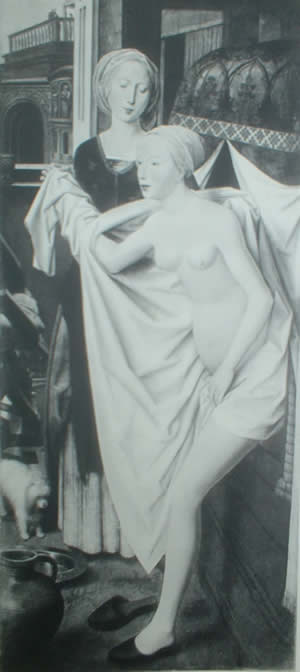 |
|
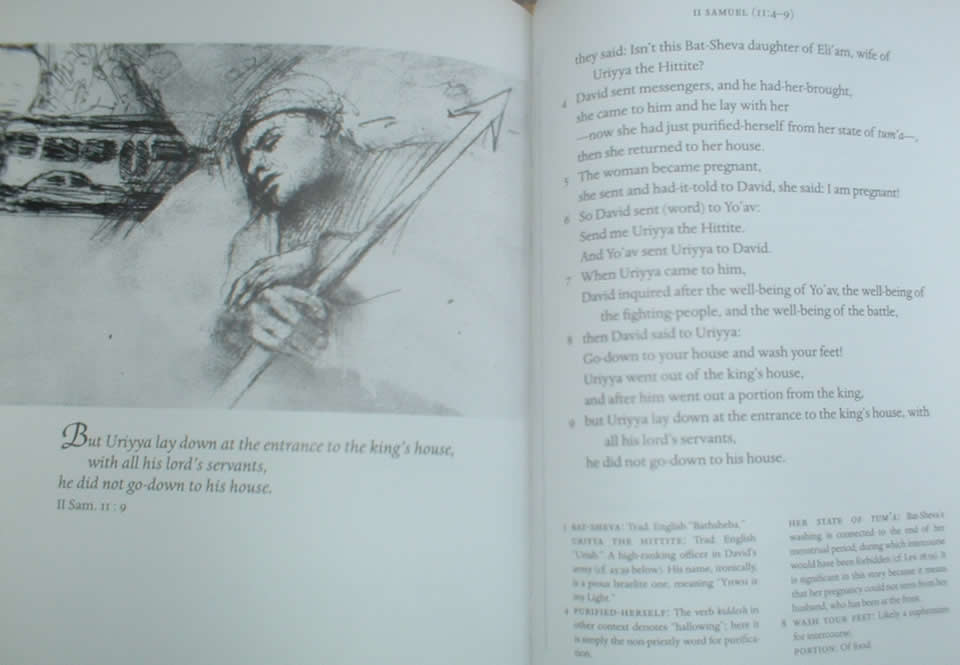
|
"While
later Jewish tradition, both in the biblical book of Chronicles
(which omits this story) and in the Talmud (which whitewashes
David), clearly found it difficult to reconcile the important
symbolic figure of David with the way he appears in this story,
the Book of Samuel features it dramatically as the root of much
that is to follow, and lavishes a good deal of artistic attention
and skill upon it.
"It is, like so many central biblical tales, constructed
on a foundation of leading words - in this case, "lie"
and "send."
"Rather
than being mere signposts, these words undergo ... a "pilgrimage";
they are transformed within the story...
"From the initially neutral "lying-place",
David's rooftop couch, we are taken to the crime, where he "lies"
with Bat-Sheva
(11:4).
"The verb next appears in Uriyya's
righteous refusal to go back home in the midst of the war.
"And I, I should come into my
house to eat and to drink and to lie with my wife?"
(11:11)
[Rachel:
"righteous" is a term I detest [feeling!]. In this
context, moreover, it harly conveys what is so special about
this Canaanite citizen - Uriyya's solidarity with his soldier
companions on the battle field , as contrasted to the Israelite
king's abominable lack of solidarity on his couch on the roof...]
"It then becomes part of
David's punishment:
"I will take-away your women.
~~~ your fellow~~~will lie with your women"
(12:11).
"The
ending moments of the story trace David's movement back into
the realm of forgiveness and resolution, with his "lying
upon the ground"
(12:16), pleading
for his son's life, and his final, legitimate "lying"
with Bat-Sheva, which results in the conception of the promised
heir, Shelomo.
"The other
key word, "send,"
has a parallel function. Eleven times (in twenty-six verses),
messages and people are sent, almost always by David, the master
manipulator. ...........
......
"The
story finds additional uses for sound. Natan's parable .....
the description of the lamb:
"from his morsel it would eat,
from his cup it would drink,
in his bosom it would lie-
it became to him like a daughter/BAT."
"... the "eat/drink/lie"
sequence echoes Uriyya's ... refusal... and the coincidence
of Bat-Scheva's name is
surely no coincidence. So while the unwitting king angrily condemns
the rich man of the parable, the audience, its ears tuned aright,
can feel the trap being sprung.
...
"The David
and Bat-Sheva story is an intimate look at David's many moods,
and shows what he is capable of, for good and
for ill, in a variety of situations. In the writer or
editor's scheme of things in II Samuel, it is a point from which
David, despite the happy endings of this chapter (Shelomo's
birth and David's capture of Rabba /Rabbat-Amon], can
never fully recover. From now on the misfortunes of the country
will be identical with those of the House of David."
|
Continuation of Everett Fox's intros to chapters in "Give
us a King"
From THE GREAT REBELLION
2. Samuel 13-20
[Amnon
- Tamar - Avshalom]
[part of the text see Victims
of Sex Drive]
"What
could not have been imagined about the David who slew Golyat,
outmaneuvered Sha'ul, conquered Jerusalem, and received God's
spirit and blessing, now comes to pass.
"Beginning with an episode in which sexual transgression
and violence immediately make their reappearance, family ties
are betrayed and destroyed, and David's once "firm"
kingdom - his "house" - totters. Jerusalem becomes
dangerous, and the king is forced into exile across the very
Jordan by way of which, in biblical tradition, the Israelites
conquered the land. Only intervention by God, and continued
action by David's ruthless general Yo'av, prevents David from
being overthrown or assassinated.
"The
cycle of stories about Avshalom's revolt concerns both David's
decline - which had begun in chapter 11 with his non-participation
in the Ammonite campaign and his subsequent foray into adultery
and murder - and the downfall of his rebel son. Avshalom is
many things, but none so much as his father's son, with his
good looks, worldly wisdom, and charisma.
It is as if David is forced to relive what
Sha'ul had experienced of him. "
|
And
the battle there was scattered over the face of all the ground;
more did the forest devour among the fighting-people than the sword
devoured on that day.
And
Avshalom... was riding on a mule,
and when the mule came under the thick-boughs of a great oak,
his head became held-fast in the oak,
so that he was left-hanging between heaven and earth,
while the mule that was under him crossed-on.
A certain man saw (him) and told Yo'av, he said:
Here, I saw Avshalom hanging from an oak!
Yo'av said to the man, the one tellling him:
Now here, you saw (him) -
so why didn't you strike him down there to the ground?
I would have to (have) given you ten pieces-of-silver and a belt!
The man said to Yo'av:
(Even) if I were feeling-the-weight in my palms of a thousand pieces-of-silver,
I would not stretch out my hand against the king's son,
for (it was) in our hearing that the king charged you ..., saying;
Guard for me the lad Avshalom!
Yo'av said:
I won't wait-around thus before you!
So he took three darts in his palm
and pierced Avshalom's heart (with) them
- he was still alive in the heart of the oak.
There surrounded (him) ten fighting lads, Yo'av's weapons bearers;
they struck Avshalom and put-him-to-death.
then Yo'av sound a-(piercing) blast on the shofar
so that the fighting-people turned-back from pursuing after Israel,
for Yo'av held-back the people.
They took Avshalom
and threw him in the forest, into a great pit,
and set up over him a heap of stones, exceedingly large,
while all Israel fled, each-man to his tent.
|
"The
vocabulary of the cycle is striking and effective. The ebb and
flow of David's flight and restoration are traced through the
repeated use of "cross"
and "return"
in
ch. 15 and ch.19,
"The
Amnon and Tamar story
with which the cycle opens recalls some of the leading words
of the David and Bat-Sheva episode ( "lie,
"feed," "dead"), but also introduces
the central word-play of the entire sequence: variations on
the word "heart'.
The "heart-shaped-dumplings"
(13:6) which Amnon requests
of his sister foreshadow a major issue; who, the king or his
long-haired son, will command the affections ("heart")
of the people (15:6, 19:15)...
It is surely no accident that Avshalom dies "in
the heart" of a tree, thrust, not through the
groin as were the earlier political casualties in the book,
but through "the heart"
(18:14)
"Then
, too, Avshalom's name ("Father
is Peace") is subject to significant
wordplay in the narrative. The king, after their initial reconciliation,
tells his son to "go in peace"
(15:9); Ahitofel advises Avshalom
that he will personally kill the king, and thus bring about
peace (18:
2-3); David's anxious question about his son, "Is
there peace with him?" (18:29,32,
the biblical phrase for "'Is he well?") plays
up the irony of what we know but he does not: that his "peaceful"
Avshalom is dead. The king is finally able to return to his
throne "in peace"
(19:25,31), but it is only
through decisive, violent acts by Yo'av and the "wise woman"
of Avel (20:10-21), cloaked
in words of "peace"
(20:19), that the kingdom
will be made safe at last."
Yo'av
, who pierced
Avshalom's heart
- he was still alive in the heart
of the oak -
brings Avshalom's corpse to his father.
(Phillip Ratner's compassionate painting....
the Biblical
text says, that Avshalom was thrown into a pit)
|
|
"It is worth noting that, just as the
book
opened with a woman (Hanna) as a character
who expressed central emotions and ideas,
this section
(and much that has preceded it) turns
on the deeds done to and by women.
The Bat-Sheva incident is followed immediately by the rape
of Tamar,
which in turns gives way to the "wise woman" of Tekoa
as a vehicle for seeming reconciliation between David and Avshalom.
It will take another such woman to bring the rebelling to a close
in chapter 20;
her counsel leads to the last of the book's beheadings..."
"...
David resembles no other biblical character so much as Yaakov
in Genesis.
"Like
the patriarch, David is heavily involved with women;
he is unable to put a brake on his sons' behavior, which reflects
some of his own;
and his passivity in dealing with them strangely echoes that
of Ya'aqov in Gen.
37.
Both
men, who are themselves younger sons, find trouble as a result
of "love';
they
experience exile and the threat of death,
and bereaved of beloved sons in their declining years,
end their lives as shadows of their former selves,
so different from such paragons as Avraham and Moshe."
But isn't
this exactly the reason,
why "Ya'aqov" is "Israel"
and "David" is "Messiah"?
|
|
David certainly
knew how to feel and how to move his emotions through Body.
He knew how to sing and to dance and he knew how to weep and to mourn
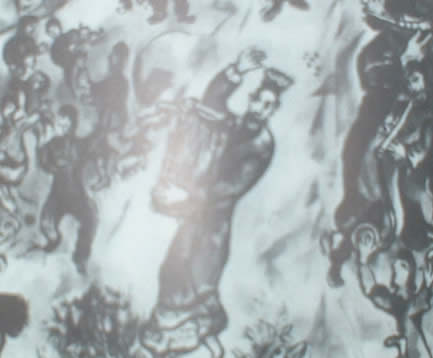
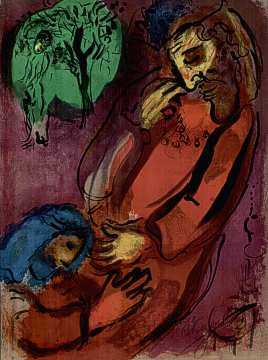
How David dreads the news about his rebellious son's death
and despite all denials of his presentiments had to face his death.
Yoav's blame against David's excessive grief is justified.
And still - it touches my heart, I who never knew a father,
how both Ya'aqov and David could
weep and cry about a son.
Now
David was sitting between the two gateways,
and the watchman on the roof of the gate went over to the
city-wall;
he lifted up his eyes and saw: here, a man was running alone!
The watchman called out and told the king,
and the king said;
If he is alone, (there is) news in his mouth.
And as he went, going-along and coming-nearer,
the watchman saw another man running;
the watchman called out to the gatekeeper
and said:
Here, (another) man is running alone!
The king said;
This-one too is bringing-news.
The watchman said:
I see (that) the running-manner of the first-one is like the
running-manner of Ahima'atz son of Tzadok.
The king said:
He is a good man, and with good news he comes!
Ahima'atz
called out and said to the king: Peace!
And he prostrated-himself to the king, his brow to the ground,
and said:
Blessed is YHWH your God,
who has turned over the men who lifted their hand against
my lord king!
The king said;
Is there peace with the lad, with Avshalom?
Ahima'atz said:
I saw a great commotion whenYo'av sent off the king's servant
and your servant,
but I don't know what (it is about).
The king said:
Turn-around and station-yourself here.
He turned-around and stopped.
And here, the Cushite came,
and the Cushite said:
Let my lord king receive-the-news
that YHWH has vindicated you today from the hand of all those
rising against you!
The king said to the Cushite:
Is there peace (with him), the lad Avshalom?
The Cushite said:
May they be like that lad, my lord king's enemies and all
those who have risen against you for evil!
The king was shaken;
as he went-up to the upper-part of the gate, he
wept,
and thus he said as he went;
O my son
Avshalom,
my son, my son Avshalom!
Who would give my dying, my (own) in your place!
O Avshalom, my son, my son!
And
it was told to Yo'av;
Here, the king is weeping and mourning
over Avshalom.
now the deliverance became mourning on that day for all the
people,
for the people heard on that day, namely:
The king is in pain over his
son.
So the people stole away on that day, while coming into the
city,
like people stealing away humiliated when they flee in battle.
Now
the king wrapped his face,
and the king cried out in a loud voice;
O my son Avshalom,
Avshalom, my son, my son!
|
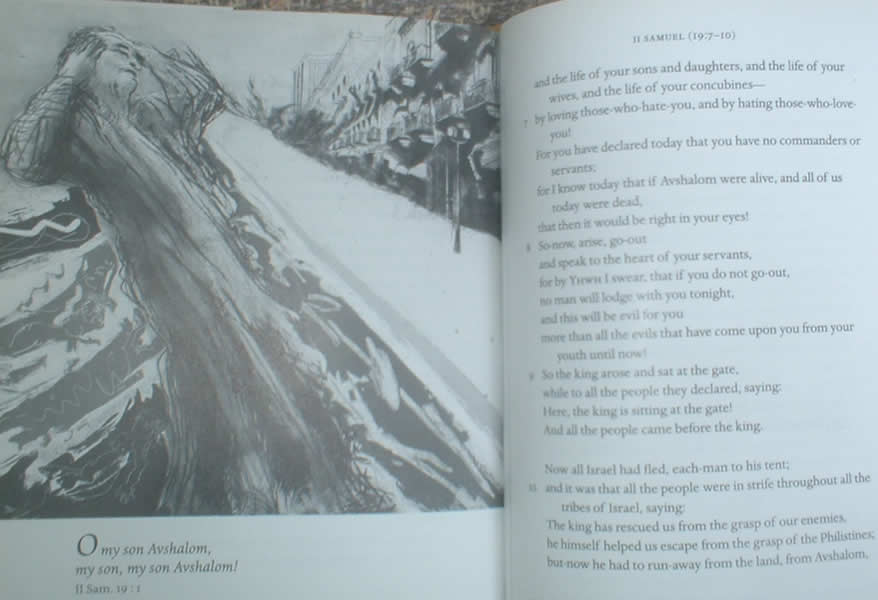
When
Yo'av came to the king in the palace-house,
he said;
Today you have shamed the face of all your servants
who helped your life escape today
and the life of your sons and daughters, and the life of your
wives, and the life of your concubines-
by loving thoses-who-hate-you, and by hating those who love-you!
for you have declared today that you have no commanders or
servants;
for
I know today that if Avshalom were alive, and all of us today
were dead,
that then it would be right in your eyes!
So-now,
arise, go-out
and speak to the heart of your servants,
for by YHWH I swear, that if you do not go-out,
no man will lodge with you tonight,
and this will be evil for you
more than all the evils that have come upon you from your
youth until now!
So the king arose and sat at the gate,
while to all the people they declared, saying;
Here, the king is sitting at the gate!
and all the people came before the king.
Now
all Israel had fled, each-man to his tent;
and it was that all the people were in strife throughout all
the tribes of Israel, saying:
The king has rescued us from the grasp of our enemies,
he himself helped us escape from the grasp of the Philistines;
but-now he had to run-away from the land, from
Avshalom,
While Avshalom, whom we anointed over us, has died in battle.
...
|
This is not yet the end of the rebellion.
When David finally returns to his city and throne,
the only "healing" he is able to carry out,
sorry for being so cynical, [see
"victims of sex-drive"]
is to take the ten concubines, defiled by his son Avshalom
and put them in a house under guard and sustained
them,
but in to them he did not come,
for they were tied-off until the day of their death to living widowhood.
2.Sam. 20:3
Off he sends his men to fight another rebel from Avshalom's party,
Sheva ben Bikhri,
and it's only thanks to a very wise woman,
that an end is put to the atrocious fraticide,
caused by David and the
reflection of his lack of wholeness in Avshalom.
But again:
It was not Abraham who became "Israel",
but Ya'aqov,
the 'Heel-Sneak',
the bypasser, cheater, deceiver
[who, too, was infatuated with only one of his sons, whom he favored
and becried]
and it was not Moses who became "Messiah".
It was this D
A V I D , the naked king of feelings
who leaped and whirled ...
I breathe, I move,
I sound ~~~ Heaven to Earth

 
|
